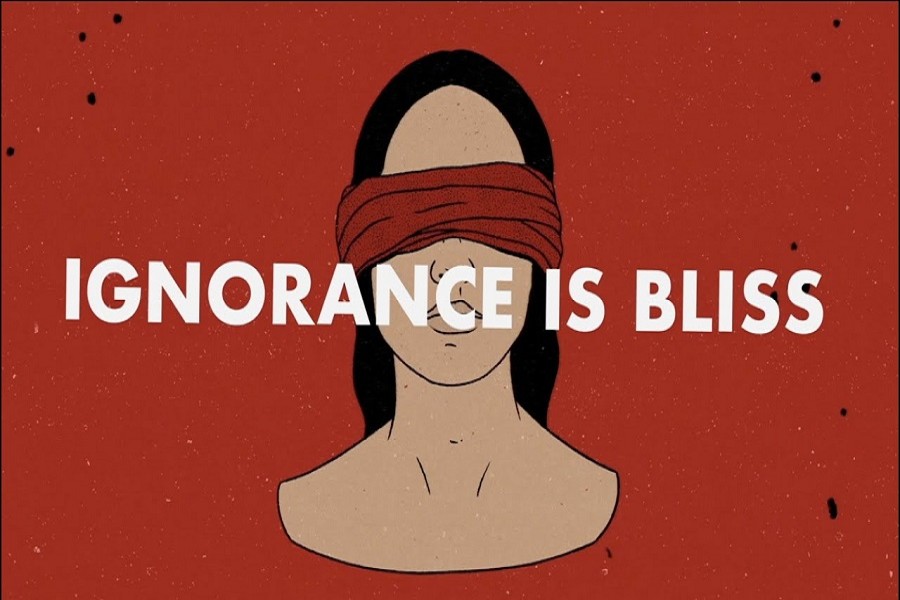Our intelligence gives us an insight of what is around us; it gives us an understanding of what might happen in future; it gives us the instinct to consider all possible scenarios while taking the next step. With hindsight, all of these together seem to contribute to our better understanding and better preparation of the world that lies ahead of us.
The question is whether such intelligence helps us lead a better life or brings us misery. We, the humans, are born ignorant. Throughout life, we grind to earn knowledge and get a better life. In many aspects, the people with higher intelligence tend to overthink. In a study, Canadian psychologist Alexander Penney and his colleagues surveyed more than 100 students at Lakehead University in Ontario, Canada. They asked the students to report their levels of worry.
The researchers found that students with more angst -- for instance, those who agreed with survey statements like “I am always worrying about something”-- had scored higher on a verbal intelligence test. Hence, this showcases how some students tended to worry less in comparison to others.
Asked if individuals with a lower IQ feel less stress, Md Azharul Islam, assistant professor of educational and counselling psychology at Dhaka University, mentioned that it is partially true. “To understand the connection between stress/suffering with high IQ, we need to understand how our psychological or mental domain works. By the psychological domain, we usually refer to internal mental processes such as thinking, imagination, reasoning, etc. A person with high cognitive abilities intuitively can think deeply. Therefore, he or she might feel miserable observing so many inequalities in society as a whole,” he said.
However, he also noted that a highly intelligent person can manage his/her thought/emotion by making rational and logical thought and expectation. Therefore, we cannot confirm the above claim for sure. It is the individual differences that eventually matter.
When asked if ambition also reduces if one is not well versed, Mr Azharul Islam feels that the longing for something bigger is a natural human trait. A person normally is not content with what they possess. They want more and more. The issue with brilliant people might be even more problematic because they can imagine or expect very ambitious things in life.
“A typical Bangladeshi would be happy to visit Dhaka airport. For me, as I have already visited many international airports across many countries, Dhaka airport never gives me a happy feeling. Because whenever I enter it, the comparison with Dubai airport comes to my mind; therefore, a feeling of inadequacy automatically hits me” he added.
One large study led by Ruth Karpinski of Pitzer College surveyed more than 3700 members of Mensa, a society whose members must have an IQ in the top two per cent, which is typically about 132 or higher. The team went on to ask about many factors, including mental health. They discovered that mood disorders and anxiety disorders were extremely common among Mensa members.
Among the general population, about 10 per cent of people have mood disorders and about 10 per cent of people have some anxiety disorders, with some degree of overlap between the two. Among Mensa members, those percentages were much higher. About 20 per cent reported having been diagnosed with an anxiety disorder and nearly 27 per cent had been diagnosed with a mood disorder such as major depression or bipolar disorder.
This research again showcases how more intelligent people tend to bring more pressure on themselves. While those who perhaps don’t take much pressure, tend to be slightly laid back in this regard.
History further gives us an insight of how the most brilliant people in history have suffered tremendously from mental problems. The story of Vincent Van Gogh cutting off his ear, Beethoven’s bipolar disorder, etc. somewhat proves how intelligence may have its darker sides. However, it is to be mentioned that this does not give complete evidence. Rather it is a subjective observation.
Does it mean that ignorance is actually bliss? Mr Azharul Islam disagrees about it. “Not really. By ignoring, we are suppressing something perhaps more important for our life. You might say, let's ignore the traffic issue of Dhaka and be happy by ourselves. It doesn't work like that. If you somehow (through TV/internet) know other modern countries' traffic situation, you cannot stop thinking about it. The key point, though, is, I repeat, acceptance and making use of rational thinking. If a person analyses the context logically and rationally, he/she might not feel dumb,” he explained.
From what is discussed above, we can say that knowing things better and deeper than others might have a mental toll sometimes, but ignorance should never be cherished to find peace.
Ismot Hasnine Masrur E Khuda is a student at the University of Dhaka.


